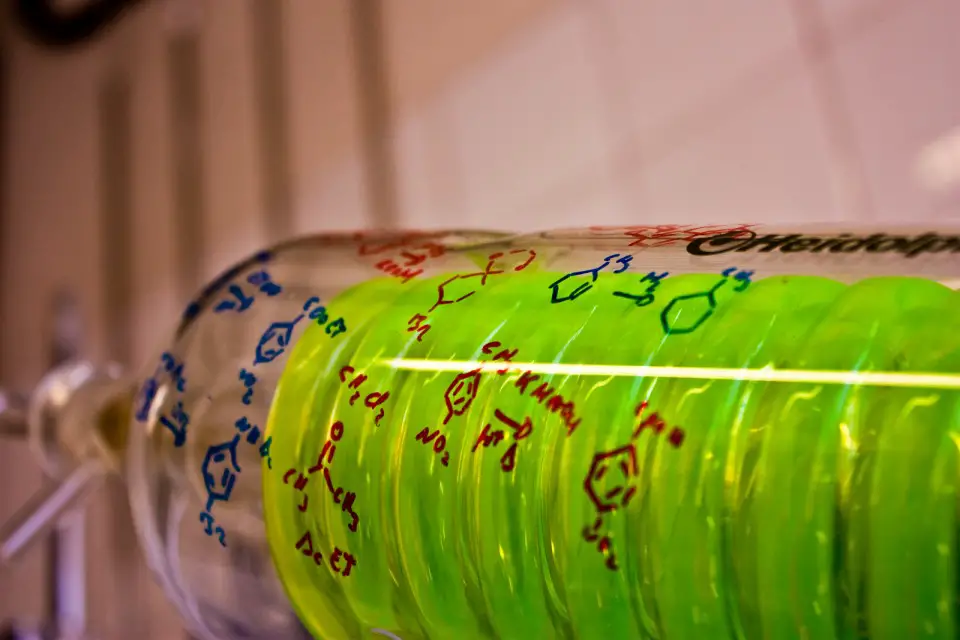This web dedicated to educational resources of free access in the area of Chemistry. It aims to provide useful information for university and high school students.

Search By Topic
Generalities
Organic Chemistry
Spectroscopy
Lab Experiments
Lewis Structures
Science is the body of knowledge whose objectives deal with nature, society, man and his thought. It was born as a consequence of man’s desire to interpret in a rational way all the phenomena that surround him.
Consequently, science is not only an organized set of knowledge that obeys a conglomerate of laws or general principles, but it is an ongoing process in which man seeks the truth through intelligence and with the help of the scientific method.
Its development is an evident manifestation of civilization. The knowledge covered by science should be divided into different branches, one of which is chemistry, which deals with the study of the transformations of matter.
Origin of the word Chemistry
The origin of the word chemistry is not known with certainty. Although with differentiated nuances, the most widespread opinion is due to Edmund von Lipman, who derives it from the Egyptian word charne, meaning black, and would have its justification in that the Nile valley is made up of black soil.
For this reason, in ancient times, Egypt would be called Chemia or Chamia (Cham country). The term chemis could mean the black art, however, other authors affirm that the word Khmeia derives from the name that the Egyptians gave to their country: Kham, if so it would mean the Egyptian art or art of the black country. The word Khemeia would be converted by the Greeks into Chemia, which would be Egyptian art.
According to other opinions, it seems that Khemeia comes from the Greek khumos, which means juice, so that Khemeia would be the art of extracting juices. Such juices could be understood as metals or their derivatives, so that Khemeia would be the art of metallurgy. However, for other authors this word means to melt, if so this word would be the art of melting.
The addition of the article al (from Arabic) gave rise to alchemy. This prefix disappeared later. Other authors such as Mahdihassan claim that it derives from the Chinese Chim-i meaning “ juice for making gold”, and is pronounced (in the dialect of the Fu-kien area) as krim-ya.
The name Chemistry appears for the first time in an edict of the emperor Diocletian in 296 in which he ordered the burning of the books of the Egyptians in Alexandria that dealt with Chemeia.
Definition
Chemistry could be defined as: the science that deals with the study of matter, its composition, properties and the transformations which it undergoes.
Therefore, it studies the characteristic properties of pure substances, as well as the interactions between them that originate modifications, more or less deep and permanent, of their nature.
Branches of fundamental chemistry
The breadth of chemistry is such that, for its knowledge and development, it is convenient to delimit different fields, dividing them into several branches. The most generally accepted are:
- Analytical Chemistry: studies the set of principles, laws and techniques necessary for the determination of the qualitative and quantitative elemental composition of pure substances and their identification in samples of greater or lesser complexity. It is subdivided into quantitative and qualitative analytical chemistry.
- Biological Chemistry (Biochemistry): deals with the study of the chemical transformations that occur in living beings. The ultimate goal is to explain, through molecular bases, the processes and properties of living beings.
- Physical Chemistry or Chemical Physics: establishes and develops the fundamental physical principles of the relationships between structure and properties of substances both in their pure state and as part of solutions, mixtures, etc.
- Organic Chemistry: mainly studies carbon compounds. Initially, it dealt with the study of compounds that form living beings or organisms, hence the origin of its name. Currently, these compounds can be obtained in the laboratory by synthesis.
- Inorganic Chemistry: studies the chemical elements and compounds made up of the rest of the elements of the periodic system and some carbon compounds. It also deals with the chemical effects produced by ionization radiation: -α-, -β-, -γ- and -X-rays within radiochemistry.
Branches of of applied chemistry
These branches of chemistry are usually grouped under the title of fundamental chemistry. On the other hand, and according to their more immediate objectives, there are other branches that can be grouped under the title of applied chemistry. For example, Industrial Chemistry (Chemical Engineering), which deals with the manufacture (industrial procedures for obtaining substances) and conservation of products of general utility. Agricultural Chemistry, which studies soils, fertilizers and other products related to agriculture, Pharmaceutical Chemistry, etc.
Despite this division, encouraged in part by the evolution it has undergone, the current development of chemistry at the beginning of a new century shows the difficulty of establishing a strict delimitation of the branches. This is due to the fact that their interdependence is increasingly greater, and we can speak of Organometallic Chemistry, Biorganic Chemistry or Physical and Theoretical and Computational Organic Chemistry.
Therefore, not only is it a basic science that helps us understand many aspects of our lives, but its application benefits us in many ways.
Thus, it is a key tool in the discovery and development of drugs that improve health and prolong our lives. It also contributes to the increase in food production, in the discovery of alternative energy sources, or in the research of new materials.
These are some examples that demonstrate how chemistry can contribute to solve some of the problems of today’s society.